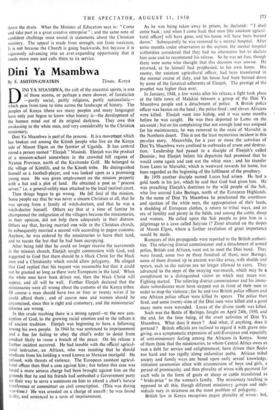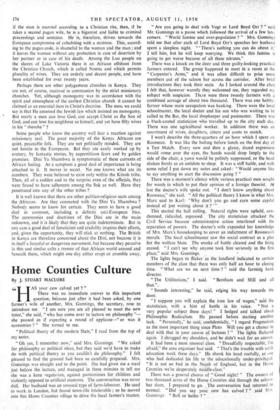Dini Ya Msambwa
DIN1 YA MSAMBWA, the cult of the ancestral spirits, is one of those storms, or perhaps a mere shower, of fanaticism —partly social, partly religious, partly nationalistic— which pass from time to time across the landscape of history. The peoples of Kenya (there are many peoples and many languages) have only just begun to know what history is—the development of the human mind out of its original darkness. They owe this awakening to the white man, and very considerably to the Christian missionary.
Dini Ya Msambwa'is part of the process. It is a movement which has broken out among the Kitosh people who live on the Kenya side of Mount Elgon on the fcontier of Uganda. It has centred round a person named " Eleejah " Masindi. Eleejah was the product of a mission-school somewhere in the crowded hill regions of Nyanza Province, north of the Kavirondo Gulf. He belonged to the village of Kimilili, and to the Kitosh tribe. He distinguished himself as a football-player, and was looked upon as a promising young man. He was given employment on the mission property ,with a but and a plot of land. He obtained a post as " process server," i.e. a general-utility man attached to the local (native) court.
Then things began to go wrong. He fell foul of the mission. Some people say that he was never a sincere Christian at all, that he was sprung from a family of witch-doctors, and that he was a witch-doctor himself. Others say that at a time of famine he championed the indignation of the villagers because the missionaries, in their opinion, did not help them adequately in their distress. Others say that, having married one wife in the Christian church, he subsequently married a second wife according to pagan customs. Anyhow, he was ordered by the missionaries to leave their land, and to vacate the but that he had been occupying.
After being told that he could no longer receive the sacraments in the mission church, Eleejah sought communion with God, and suggested to God that there should .be a black Christ for the black men and a Christianity which would allow polygamy. He alleged that God replied that his request was reasonable but that it could not be granted so long as there were Europeans in the land. When the white men have been driven out, then the black Christ will appear, and all will be well. Further Eleejah declared that the missionaries were all wrong about the customs of the Kenya'tribes. Of course a man should have two or four or twenty wives if he could afford theth ; and of course men and women should be circumcised, since this is right and customary, and the missionaries' reforms are wrong.
In this crude teaching there is a strong appeal—tc the new con- ception of God, to the growing racial emotion and to the influen.-:e of ancient tradition. Eleejah was beginning to have a following among his own people. In 1944 he was sentenced to imprisonment and a fine for failing to obey flap chief's order to desist from conduct likely to cause a breach of the peace. On his release a further incident occurred. He had trouble with the official agricul- tural inStructor,, an . African, who was insisting that he should eradicate from his holding a weed known as Mexican marigold. He refused, with threats of violence. The European assistant agricul- tural officer then filed a case against him ; but before this case was heard a more serious charge had been brought against him on the grounds that he and his friends had ambushed a Government party on their way to serve a summons on him to attend a chief's baraza (conference or committee) on civil conscription. (This was during war-time.) He was arrested on a charge of assault ; he was found guilty, and sentenced to a term of imprisonment. As he was being taken away to prison, he declared: " I shall come back ; and when I come back that man [the assistant agricul- tural officer] will have gone, and his house will have been burned down." Subsequently he was removed to a mental hospital. After some months under observation in the asylum, the mental hospital authorities considered that they had no alternative but to declare him sane and to recommend his release. So he was set free, though there were some who thought that this decision was unwise. He returned, as he himself had prophesied, to his own home. His enemy, the assistant agricultural officer, had been transferred in the normal course of duty, and his house had been burned down by some of the fanatical adherents of Eleejah. The prestige of the prophet was higher than ever.
In January, 1948, a few weeks after his release, a fight took place at the little town of Malakisi between a group of the• Dini Ya Msambwa people and a detachment of police. A British police officer was beaten on the head ; the police fired ; and eleven Africans were killed. Eleejah went into hidin'g, and it was some months before he was caught. He was then deported to Lamu on the sea-coast ; but on his complaining that not enough land was assigned for his maintenance, he was removed to the oasis of Marsabit in the Northern desert. This is not the least mysterious incident in this peculiar story. Meanwhile, for a year or more the activities of Dini Ya Msambwa were confined to outbreaks of arson and destruc- tion. Leadership had passed to a disciple of Eleejah's called Donisio ; but Eleejah before his departure had promised that he would come again and cast out the white man ; and his transfer from Lamu to Marsabit, which is westward towards his home, has been regarded as the beginning of the fulfilment of the prophecy.
By 1950 another disciple named Lucas had arisen. He had a gold tooth in his jaw, which he said that God had given him. He was preaching Eleejah's doctrines to the wild people of the Suk, who live around Lake Baringo, north of the European Highlands. In the name of Dini Ya Msambwa he proclaimed the overthrow and ejection of the white men, the appropriation of their lands, a shedding of European clothes, a return to tribal ways, and an era of fertility and plenty in the fields, and among the cattle. sheep and women. He called upon the Suk people to join him in a pilgrimage to a cave called Saiyune (? Zion) situated on the slopes of Mount Elgon, where a further revelation of great importance would be made.
Rumours of this propaganda were reported to the British authori- ties. The relieving district commissioner and a detachment of armed police, British and African, went out to meet the Dini band. They were found, some two or three hundred of them, near Baringo, some of them dressed up in ancient war-like array, with shields and spears, 'such as the natives are no longer allowed to carry. They advanced to the steps of the swaying war-march, which may be a compliment to a distinguished visitor or which may mean war. Fighting started. The relieving district commissioner and his imme- diate subordinates must have stepped out in front of their men in order to stop the violence ; for he and two British police officers and one African police officer were killed by spears. The police then fired, and some twenty-nine of the Dini men were killed and a good many more were wounded. Lucas of the divine tooth was killed.
Such was the Battle of Baringo, fought on April 24th, 1950, and the end, for the time being, of the overt activities of Dini Ya Msambwa. What does it mean ? And what, if anything, does it portend ? British officials are inclined to regard it with grave mis- giving, as a symptomatic expression of anti-European and especially of anti-missionary feeling among the Africans in Kenya. Some of them think that the missionaries, to whom Central Africa owes so vast a debt for service and enlightenment, have driven their flocks too hard and too rigidly along unfamiliar paths. African tribal society and family ways are based upon early sexual knowledge, initiation ceremonies often with circumcision of boys and girls, a period of promiscuity, and then plurality of wives with payment for each wife in the form of goats or sheep or cattle transferred as " bride-price " to the woman's family. The missionary teaching is opposed to all this, though different missionary groups and indi- viduals vary in strictness on the moot problem of polygamy.
British law in Kenya recognises pagan plurality of wives ; but, if the man is married according to a Christian rite, then, if he takes a second pagan wife, he is a bigamist and liable to criminal proceedings and sentence. He is, therefore, driven towards the European compromise of cohabiting with a mistress. This, accord- ing to the pagan code, is shameful to the woman and the man ; and it leaves the woman without any protection in case of desertion by her partner or in case of his death. Among the Luo people on the shores of Lake Victoria there is an African offshoot from the Christian Church, which is called Nomia and which permits plurality of wives. They are orderly and decent people, and have been established for over twenty years.
Perhaps there are other polygamous churches in Kenya. They are not, of course, received in communion by the strict missionary churches. Yet, although monogamy was in accordance with the spirit and atmosphere of the earliest Christian church it cannot be claimed as an essential item in Christ's doctrine. The most. we could say is that He assumed the Jewish law which insisted on monogamy. But surely a man can love God, can accept. Christ as the Son of God, and can love his neighbour as himself, and yet have fifty wives in his "shatnba " ?
Some people who know the country well fear a reaction against missionary zeal. The great majority of the Kenya Africans are quiet, peaceable folk. They are not politically minded. They are not hostile to the Europeans. But they are easily worked up by oratory, by fantastic stories, by superstitious fears and by golden promises. Dini Ya Msambwa is symptomatic of these currents of African feeling. As a symptom a good deal of importance is being attached to it. It moves in secret_ No one knows what are its numbers. They were believed to exist only within the Kitosh tribe. Then, all of a sudden and to the surprise even of the officials, they were found to have adherents among the Suk as well. Have they penetrated into any of the other tribes ?
It is well known that there are other politico-religious sects among the Africans. Are they connected with the Dini Ya Msambwa ? Nobody seems to know for certain. They seem to have a good deal in common, including a definite anti-European bias. The ceremonies and doctrines of the Dini are in the main "unknown, and it is likely that they are quite indeterminate. But in any case a good deal of fanaticism and credulity inspires their efforts, and, given the opportunity, they will stick at nothing. The British in Kenya are therefore concerned about the Dini, not because it is in itself a forceful or dangerous movement, but because they perceive in this and similar cults a tremor of that African world around and beneath them, which might one day either erupt or crumble away.



































 Previous page
Previous page